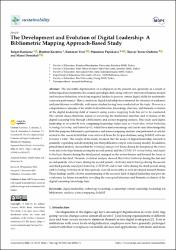The Development and Evolution of Digital Leadership: A Bibliometric Mapping Approach-Based Study

Göster/
Erişim
info:eu-repo/semantics/openAccessTarih
2022Yazar
Karaköse, TurgutKocabaş, İbrahim
Yirci, Ramazan
Papadakis, Stamatios
Özdemir, Tuncay Yavuz
Demirkol, Murat
Üst veri
Tüm öğe kaydını gösterKünye
KARAKÖSE, Turgut, İbrahim KOCABAŞ, Ramazan YİRCİ, Stamatios PAPADAKİS, Tuncay Yavuz ÖZDEMİR & Murat DEMİRKOL. "The Development and Evolution of Digital Leadership: A Bibliometric Mapping Approach-Based Study". Sustainability, 14.23 (2022).Özet
The inevitable digitalization of workplaces in the present era, generally as a result of
technological developments, has caused a paradigm shift, along with new innovative business models
and business behaviors, which has required leaders to possess certain digital skills for sustainable
corporate performance. Hence, studies on digital leadership have attracted the attention of academics
and practitioners worldwide, with many studies having been conducted on the topic. However, a
comprehensive analysis of the intellectual architecture, knowledge structure, and thematic evolution
of the digital leadership field of research using science mapping tools has yet to be conducted.
The current study, therefore, aimed at reviewing the intellectual structure and evolution of the
digital leadership field through a bibliometric and science-mapping analysis. This study used digital
leadership as an umbrella term comprising leadership styles such as e-leadership, virtual leadership,
technology leadership, and leadership 4.0, which have similar meanings and can be used interchangeably.
With this purpose, bibliometric performance and science mapping analysis was performed on articles
related to the research field that were retrieved from the Scopus database using SciMAT software
(version 1.1.04). The results of the study revealed that the scope of digital leadership research is
gradually expanding and diversifying and that publication output is increasing steadily. In addition,
period-based analysis showed that the technology management theme during the first period, the virtual
teams and technology themes during the second period, and the COVID-19, virtual reality, and digital
technologies themes during the third period emerged as the motor themes and formed the focus of
research in this field. Thematic evolution analysis showed that virtual leadership during the first and
second periods, virtual teams during the second period, e-leadership and technology during the second
and third periods, and digital leadership, COVID-19, and virtual reality during the third period, along
with technology leadership in all three periods were all noteworthy as well-developed research themes.
These findings enable a better understanding of the research field of digital leadership and provide
a reference for future research by revealing the conceptual structure and thematic evolution of the
digital leadership knowledge base.
Kaynak
SustainabilityCilt
14Sayı
23Koleksiyonlar
İlgili Öğeler
Başlık, yazar, küratör ve konuya göre gösterilen ilgili öğeler.
-
Öğretmenlerin Negativizmi İle Okul Müdürlerinin Değişime Direnişleri Giderme Yaklaşımları Arasındaki İlişkide Liderlik Stillerinin Düzenleyici Etkisi
Güllük, Fatma (Fatih Sultan Mehmet Vakıf Üniversitesi, Lisansüstü Eğitim Enstitüsü, 2022)Değişen dünyada örgütlerin değişmemesini beklemek mümkün değildir. Okullarda örgüt lideri olan okul müdürleri değişime direnişi gidermek için çeşitli yaklaşımlar uygulamaktadır. Bu yaklaşımların öğretmenler tarafından ... -
Machiavellian Leadership in Educational Organizations: Assessment and Analysis
Arıcı, İrem Demir; Kocabaş, İbrahim (Dokuz Eylul University, 2025)This study is a traditional (narrative) review of the existing literature on the concept of Machiavellian leadership in educational organizations. The main purpose of the study is to contribute to the literature in this ... -
Dönüşümcü ve İşlemci Liderlik Stilleri: Kavramsal Çerçevesi ve Eğitim Örgütleri Açısından Etkileri
Avcı, Ahmet (FSM Vakıf Üniversitesi, 2015-07)Örgütlerin iç ve dış çevrelerinde yaşanan hızlı gelişmeler, daha etkin ve etkili liderlik tarzlarının organizasyonlarda uygulanmasını zorunlu kılmıştır. Dönüşümcü ve işlemci liderlik stillerinin, örgütlerin yapılarına, ...


















